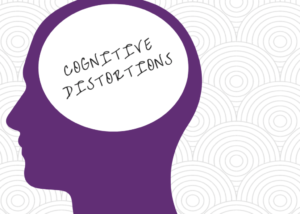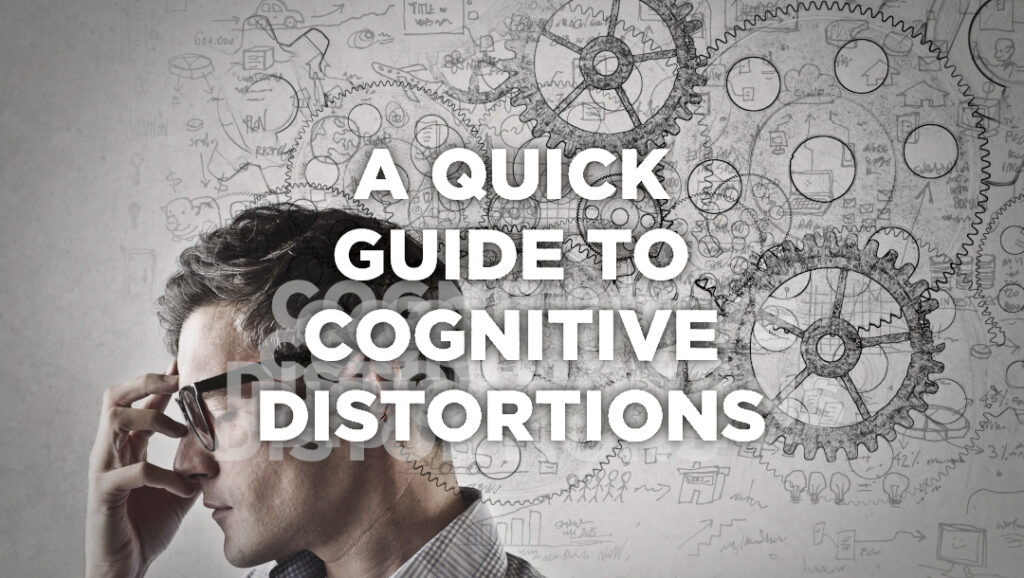Cognitive distortions are a type of irrational thought that we all experience. They can be either positive or negative and often cause us to make poor decisions in our lives. This blog post will help you identify the cognitive distortions in your life. You will also learn how to better handle them for more productive living.
Contents
What Are Cognitive Distortions?
 Cognitive distortions are irrational thoughts. These can lead to inaccurate self-judgments and negative moods. These thoughts can be harmful and inaccurate and can cause problems in your life. This is where cognitive therapy comes in. It helps identify these negative and inaccurate thoughts. This is so that you can begin to replace them with more realistic ones. It means that you can start thinking and acting in a more positive manner.
Cognitive distortions are irrational thoughts. These can lead to inaccurate self-judgments and negative moods. These thoughts can be harmful and inaccurate and can cause problems in your life. This is where cognitive therapy comes in. It helps identify these negative and inaccurate thoughts. This is so that you can begin to replace them with more realistic ones. It means that you can start thinking and acting in a more positive manner.
Different Types of Cognitive Distortions

The different types of cognitive distortions are:
All-Or-Nothing Thinking
This is when you see things in black and white – either/or, good or bad, with no middle ground. This type of thinking can lead to perfectionism and unrealistic expectations. This is especially common in people with eating disorders. It can also lead to self-judgment and a negative mood.
Overgeneralization
This is when you take one event and draw a general conclusion from it. This is not supported by the evidence. For example, if you have a bad day at work, you might think “I’m just no good at my job”. This is even though there may be other days where you had a good day at work. This can lead to feelings of hopelessness and despair.
Labeling
When you label yourself or others with negative labels, such as “loser” or “idiot”, this can lead to low self-esteem and decreased self-worth. It also limits your ability to see yourself or others in a more positive light.
Mind Reading
This is when you think that you know what other people are thinking. It is even though there is no evidence to support this. For example, you might think that your partner is not interested in you. This is because they did not call or text you back right away. This can lead to feelings of loneliness and isolation.
Catastrophizing
This is when you see a negative event as being catastrophic and far worse than it actually is. For example, if you forget to bring your laptop to a meeting, you might catastrophize by thinking “I’ll never be able to get anything done now!” This can lead to anxiety and stress.
Emotional Reasoning
This is when you believe that your emotions are facts. For example, if you feel like a failure, you might start to think that you are a failure. This can lead to feelings of hopelessness and despair. This is especially common in people with depressive disorders.
Personalization
This is when you assume that your negative emotions are primarily caused by other people, rather than take personal responsibility for the situation. For example, if someone cancels a date at the last minute and you feel angry or disappointed, it might be helpful to think “I’m feeling this way because I’m choosing to interpret things this way right now” instead of thinking “She made me feel like this! She should have known how important tonight was to me!” This can lead to feelings of resentment towards others.
Blaming
This is when you blame yourself or others for something without good evidence supporting what happened. For example, if you didn’t get the job you interviewed for, you might blame yourself by thinking “I must not have been good enough” even though there may be other factors that contributed to why you did not get the job. Alternatively, if someone else does something bad, you might blame them by thinking “She always does this! I can never depend on her!” This can lead to feelings of anger and resentment.
Control Fallacies
This is when you think that if you have a lot of rules, regulations and routines in your life then everything will be ok. For example, some people with eating disorders might feel safer having strict meal plans or schedules for overeating. This type of thinking can lead to feelings of emotional numbness as well as feeling overly responsible for what happens in others’ lives.
Jumping To Conclusions
This is when you make negative assumptions about other people. It is without any evidence supporting those conclusions. In the absence of good information, it may help to ask yourself “What are there reasons why this might not be true? What could I assume instead?” For example, someone who has been cheated on before might jump to the conclusion that their partner is cheating on them, even though there is no evidence to support this. This can lead to feelings of mistrust as well as anxiety and stress.
Magnification/Minimization
This is when you think that the impact or importance of things is much greater or smaller than they actually are. This is by focusing too narrowly on one aspect while ignoring other factors. For example, if a person thinks someone has rejected them romantically, they might magnify their own flaws while minimizing their strengths in order to make themselves feel better about the situation. Or alternatively, someone who gets really anxious before going out for drinks with old friends might minimize how enjoyable those nights usually end up being in favor of feeling like an outsider during these activities instead because it feels safer emotionally at first.
Shoulds
This is when you hold yourself or others to a set of unreasonable rules about how people should behave. For example, someone who feels bad after socializing with friends from home might think “I shouldn’t have any fun until I finish this project!” This can lead to feeling excessively responsible as well as judgmental towards self and others.
Negative Impacts of Cognitive Distortions

There are a few negative impacts of cognitive distortions. Some of these are:
Decreases Self-Worth
This is when you think that your negative emotions are evidence of personal failure, lack of strength, or worthlessness. For example, if you feel guilty about getting angry with someone who is close to you then it’s helpful to remember that guilt is not always a productive emotion and can lead to feeling stuck in the past instead of moving forward towards future goals.
Decreases Adaptiveness
This is when thinking in this way does not help people achieve their goal but rather creates obstacles for them by leading to avoidance behaviors. An example would be avoiding socializing with friends because feeling anxious around others seems like too much effort at times when scheduling conflicts arise.
Increases Emotional Vulnerability
The more cognitive distortions one has, the less likely one is to express emotions and therefore feel vulnerable. This can lead to feeling cold, detached, or numb as well as not being able to connect with others in a meaningful way.
Increases Balance Issues In Relationships
Cognitive Distortions often lead people into having relationships that are unbalanced due to a lack of self-awareness and empathy for others. For example, if someone keeps pushing their partner away because they think “They’re the only one who doesn’t understand me! Why don’t they get it? They should know better by now!” then this might create serious problems within the relationship over time which could eventually cause its collapse.
Decreases Intimacy
This is when you think that your significant other can read your mind or know what’s best for you without asking. This might be because they are constantly monitoring their own behavior to avoid feeling guilty about upsetting others, even if it seems like this person does not trust them enough to make decisions on their own. It also leads people into thinking “I should always know what my partner wants and how he/she feels! That way we will never have any problems in our relationship!” this makes intimacy difficult since everyone has different needs at different times depending on the circumstance.
Increases Egocentrism
When someone thinks only of themselves all the time then they might develop a sense of entitlement such since I don’t have time for anyone else because I’m always busy thinking about myself! This can lead to a sense of superiority over others and cause problems in relationships.
Decreases Flexibility
This is when you think that the only way to accomplish your goals is by doing things “your way,” regardless of what other people recommend or offer as an alternative solution. For example, letting someone know they are not welcome in your home even though they won’t be staying very long might make them feel rejected which may then create more tension between you both than was necessary. It also makes it difficult for social support to work effectively since one person has too much control over how their life will turn out due to rigid ways of thinking.
Decreases Integrity
This is when you think that the only way to do something right is by following your own set of rules which can lead to not listening or considering other people’s opinions, even if they make sense to others outside of yourself. For example, someone might be extremely critical about themselves and self-doubt everything they say because their opinion seems like it does not matter in comparison with everyone else around them because “they know better than I do! They must be smarter/better looking/more talented at this since I clearly don’t have what it takes!”
How To Manage Cognitive Distortions?

These are the ways to manage cognitive distortions.
Educate yourself on Cognitive Distortions and their effects, so you become more aware of how they are affecting your life in negative ways. This way it will be easier to let go of them by recognizing when they happen automatically without thinking about what is really going on underneath the surface.
Create an Immediate Plan for each cognitive distortion that pops into your head during difficult times or challenging situations. For example, if someone is feeling anxious around others then having a list of self-soothing techniques ready to use can help calm down this automatic response right away before saying something hurtful out loud which might cause problems with friendships later on because people didn’t know where it came from since no one was actually upset at that moment.
Use Self-Soothing Techniques and/or Distract yourself from the cognitive distortions that you find most challenging to manage on your own, such as turning up some music or going for a walk around the block until you calm down before returning back into contact with people again. This also includes reminding yourself of why it is important to let go of these kinds of thinking patterns. This is because they only cause problems in relationships over time. This could lead them to collapse if not addressed early enough.
Conclusion
In conclusion, Cognitive Distortions are thinking patterns that influence how we perceive our internal and external experiences. When they happen automatically without much thought, it can leave us feeling overwhelmed or out of control around others which could lead to problems in relationships over time if not recognized early enough! The best way to manage these kinds of thoughts is by educating yourself on them first so that you will be able to recognize when cognitive distortions occur during difficult times or challenging situations.
If you are looking for affordable Online Counseling MantraCare can help: Book a trial therapy session


